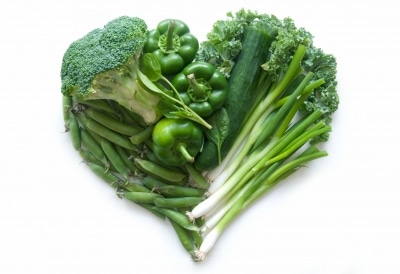Greens Your Body Needs

Saint Patrick’s Day is almost here again. We figured we’d honor that day by giving you another green post!
This article is full of information that’ll have you running to your nearest farmer’s market looking to scrounge up as many of these yummy treats as you possibly can.
We will be talking all about the best green foods that (if you aren’t already eating them) you’ll want to start eating.
The Importance of Getting Your Greens
We know the taste of greens may not be your favorite. They aren’t sweet and most of us have a sweet tooth (or teeth). However, even though you may not like them now if you continually incorporate them into your diet you’ll develop a taste for them.
Greens are so important because they come from plants. Plant-sourced foods contain polyphenols and usually a great deal of dietary fiber.
This means it’s generally safe to assume your green foods are going to fight oxidative stress and help improve your digestive tract. Both oxidative stress and an unhealthy digestive system lead to chronic inflammation and ultimately disease.
Going green isn’t just good for the planet, it’s good for your health too!
Studies show that getting just one serving of leafy greens per day can help to slow cognitive aging.
This is just one of the many benefits that we receive from this special group of produce. Check out the rest of this article to learn more.
Here are our top green foods to start incorporating into your food rotation!
Green Superfood #1: Lettuce
We use lettuce as the base for salads and in between bread, cheese, and meat slices in sandwiches. We don’t give it a whole lot of thought. It just goes there. It makes sense that it’s healthy, but it doesn’t get near as much attention as a lot of other greens.
Here are some fun facts about lettuce and why it belongs in these staple foods.
Lettuce is high in antioxidants (Vitamins C&E, and carotenoids). Lettuce also helps to balance lipid levels to help decrease cholesterol levels.
Rocket lettuce, in particular, is full of antioxidants and anticancer properties. Rocket lettuce can act as a vacuum sucking up nitrates which have been linked to gastrointestinal issues.
Green Superfood #2: Watercress
Watercress is a great addition to salads, side dishes, and sandwiches. It gives a fresh taste and sensation to whatever food you add it to.
Watercress has been found to fight cancer and reduce any damage that has been done to your DNA. Watercress is high in antioxidants, especially carotenoids helping it to reduce inflammation.
Green Superfood #3: Cruciferous Veggies
Most green leafy vegetables are in this group. Cruciferous veggies have all been found to help reduce inflammation related to oxidative stress. The main ones that are extremely beneficial to your body are kale, Brussel sprouts, and bok choy.
Kale
You hear a lot about kale with juicing. It makes sense. This powerful (both in nutrients and flavor) vegetable is packed to the brim with body-enhancing superpowers.
Kale is great extremely high in Vitamins C & K as well as polyphenols. Vitamin K has been found to be important to good bone health. So much so, that the daily recommended intake was almost doubled.
Brussel Sprouts
Polyphenols from Brussel sprouts were found to help reduce high lipid levels in the blood. A study done found that the polyphenols that are in Brussel sprouts actually alter the membranes of the erythrocytes (red blood cells).
Bok Choy
Bok choy is a form of cabbage from China. It can be eaten cooked or raw but it’s packed with tons of phenolic compounds. It may not look like much, but if you add this veggie to your diet you’ll be supplying your body with 71 different phenolics!
Green Superfood #4: Edamame
Edamame is a green pod vegetable. They’re made from the immature soybean and commonly found in Asian cuisine restaurants. These delicious little beans are full of healthy properties. The edamame was actually found to help reverse certain liver injuries.
Green Superfood #5: Nopales (Prickly Pear Cactus)
Nopal is a dish commonly found throughout Mexico. They eat the cactus as a side or even in tacos. A study was done on 3 different common Mexican breakfast foods. It was found that in the group that ate nopales with their meal had significantly better blood glucose levels after their meal.
This was especially true in the group that had a meal that was high in carbs and protein as opposed to high fat.
Nopales can be a good addition to meals to help regulate blood sugar levels.
Green Superfood #6: Seaweed
Yup! That yucky stuff that gets stuck on your leg in the ocean, it’s actually really good for you. Seaweed offers your body different proteins and polyphenols than non-marine plants.
They’ve also been found to help improve gut health and factors for both diabetes and obesity.
Green Superfood #7: Cucumber
 They’re not just good for swollen eyes, friends. They’re good for your whole body. Cucumbers give you antioxidants along with improving diabetes and cholesterol. They’re also great for helping prevent constipation.
They’re not just good for swollen eyes, friends. They’re good for your whole body. Cucumbers give you antioxidants along with improving diabetes and cholesterol. They’re also great for helping prevent constipation.
Green Superfood #8: Green Tea
Green tea is great and you probably hear that all the time, but it’s true. Green teas especially moringa and matcha offer your body a multitude of polyphenols!
Matcha green tea was found to help prevent kidney aging.
Moringa green tea was found to help scavenge reactive oxygen species that contribute to oxidative stress.
Green Superfood #9: Herbs/Spices
Herbs and spices are a great way to season your food and give it more flavor. But when you use these, you’re also providing your body with the health benefits derived from these plant sources.
Dill helps to reduce cholesterol.
Basil helps to improve blood glucose levels.
All of these green superfoods are great to incorporate into your diet. If you’ve never tried them, now that you know how good for you they are for you, give them a shot. You’ve got nothing to lose and better health to gain.This isn’t a complete list of the best green superfoods, but the ones mentioned are extremely beneficial to you. What are your favorite greens? Are they on this list? If they aren’t, leave them in the comments below and let us know why they’re your favorite!
https://www.bmj.com/content/347/bmj.f6879
https://www.ncbi.nlm.nih.gov/pubmed/29263222
https://www.ncbi.nlm.nih.gov/pubmed/15297097
https://www.ncbi.nlm.nih.gov/pmc/articles/PMC4011049/pdf/nutrients-06-01519.pdf
https://www.ncbi.nlm.nih.gov/pubmed/17044779
https://academic.oup.com/ajcn/article/85/2/504/4649753
https://www.ncbi.nlm.nih.gov/pmc/articles/PMC4063312/pdf/nihms551170.pdf
https://www.ncbi.nlm.nih.gov/pubmed/22744944
https://www.ncbi.nlm.nih.gov/pubmed/11684396
https://www.ncbi.nlm.nih.gov/pubmed/23044092
https://www.ncbi.nlm.nih.gov/pmc/articles/PMC3762684/pdf/nihms503640.pdf
https://www.ncbi.nlm.nih.gov/pubmed/30333648
https://care.diabetesjournals.org/content/30/5/1264.long
https://www.ncbi.nlm.nih.gov/pubmed/24697280
https://www.ncbi.nlm.nih.gov/pubmed/23098877
https://www.ncbi.nlm.nih.gov/pubmed/19735169
https://www.ncbi.nlm.nih.gov/pubmed/29993353
https://www.ncbi.nlm.nih.gov/pubmed/30783412
https://www.ncbi.nlm.nih.gov/pubmed/31198445